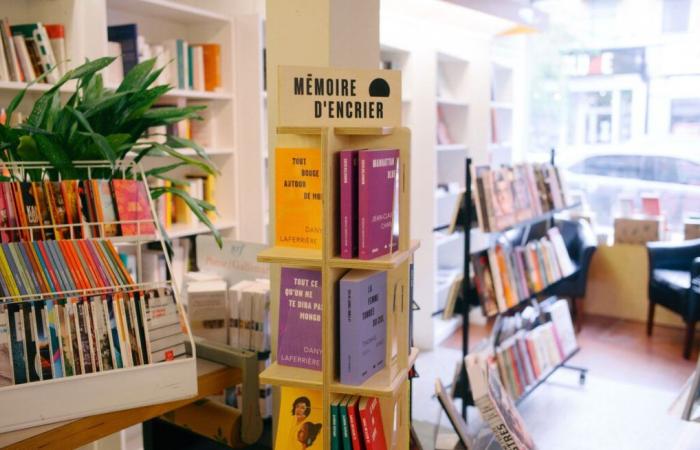Many CEGEPs have had to suspend purchases of books and documents for their libraries in recent months. The reason? The imposition by Quebec of surprise investment thresholds, which CEGEPs cannot exceed. Teachers and students suffer, but also the entire book chain. Second text in a series of three.
Independent bookstores are among the many collateral victims of major budgetary restrictions imposed by Quebec last summer on CEGEPs. They then had to considerably reduce many of their expenses, including in their library.
Many establishments have therefore suspended, in recent months, the purchase of new books and documentaries, with the exception of a few, deemed essential.
At the Zone Libre bookstore in downtown Montreal, the effect on its sales was “drastic,” says its owner, Mireille Frenette. From the beginning of September, orders from certain CEGEPs decreased considerably.
Its “biggest client” in the college network, the Cégep du Vieux Montréal, recognized for its liveliness in literature and its French Animation Center (CANIF), which regularly invites authors to classes, has for its part completely stopped ‘buy in this bookstore for a few months.
This situation has forced the business to put all new hiring on hold, since it normally draws 30% of its institutional income from CEGEPs.
Mme Frenette notes, however, that his orders from the Cégep du Vieux Montréal have resumed very recently, but “in a very modest way”, after the establishment had increased, by drawing on allocations intended for other purposes, the budget it grants to his library. This year it amounts to $150,000, at the end of this shuffling of cards, compared to $166,639 last year.
“It’s a bit like an artificial respirator,” explains sociology professor at Cégep du Vieux Montréal Stéphane Thellen. The latter doubts that the establishment will be able, next year, to reinvest in the content of its library.
The Cégep de Baie-Comeau also managed, by drawing on its surplus, to reduce its library budget to $20,000 this year, which had initially dropped to $7,500 due to restrictions imposed by Quebec.
“These amounts, normally, we keep aside for large-scale projects, such as the renovation of our student café or the library,” explains the general director, Manon Couturier, who fears not being able to ‘spare your library again next year.
However, “we agree that buying books for the library is quite at the heart of the mission of a CEGEP,” she recalls.
“It’s worrying. We still do not know our investment ceilings for the coming years,” notes the general director of the Cégep de Trois-Rivières, Éric Milette, who also managed not to reduce the budget of his library this year. But for how long?
A fragile ecosystem
Bookstores are far from being the only collateral victims of the financial challenges faced by libraries in the college network.
“The CEGEPs order everything, so in the end, it affects the entire book chain, from authors to publishers, to suppliers, this whole chain is linked, so whether we like it or not, it comes a little pushing us all around,” explains bookseller Anthony Ozorai, of Librairie Poirier, in Trois-Rivières.
The National Association of Book Publishers and publishing houses are also alarmed. “If we want to interest young people in Quebec culture, college libraries must remain rich places of discovery and acquisition of knowledge,” underlines Geneviève Pigeon, president of the association and owner of Éditions L’instant très.
“Middle school students must have access to renewed knowledge and be able to consult and borrow in-depth books as well as new literary releases,” continues M.me Pigeon.
Marika Chartrand-Ly, 19, was studying at Cégep Édouard-Montpetit last year. She is now beginning her literary studies at the University of Quebec in Montreal. “What inspires me is seeing the world make its way,” she reports.
“I understand that we must understand the past, the rules, the traditions, before embarking on works that unravel these writing traditions, but it is good to take the pulse of what is being written and happening currently. »
According to Mme Chartrand-Ly, not only should new releases fill libraries, but it is on them and on contemporary works that teaching should concentrate.
“Restrict access to books”
Several CEGEPs were not able this year to prevent a significant drop in the book acquisition budget allocated to their library, noted Duty after contacting around thirty establishments in the province.
“The entire book chain is affected,” notes Émilie Dupras-Langlais, specialist in information science at Cégep de Baie-Comeau. “It’s a fragile environment. [Les entreprises d’ici] are not multinationals rolling in gold. »
“Restricting acquisition budgets necessarily means restricting access to books,” believes the president of the Union of Quebec Writers (UNEQ), Pierre-Yves Villeneuve.
“And restricting access to books means restricting support for the literary artists who create them and make them possible. CEGEP students thus find themselves in front of bare shelves with a limited choice which does not reflect the richness and diversity of Quebec works. »
Joined by Dutythe Pantoute and La Liberté bookstores in the Quebec region have also reported financial losses amounting to several thousand dollars linked to the drop in orders from CEGEPs.
The UNEQ notes for its part that the cuts in the budgets of CEGEP libraries go against the commitments and values which, according to Prime Minister François Legault, drive the government of Quebec.
“Himself a great reader, François Legault has often spoken of the desire to make reading a priority,” underlines Mr. Villeneuve. “Obviously, reading is not as priority as the CAQ claims. »






